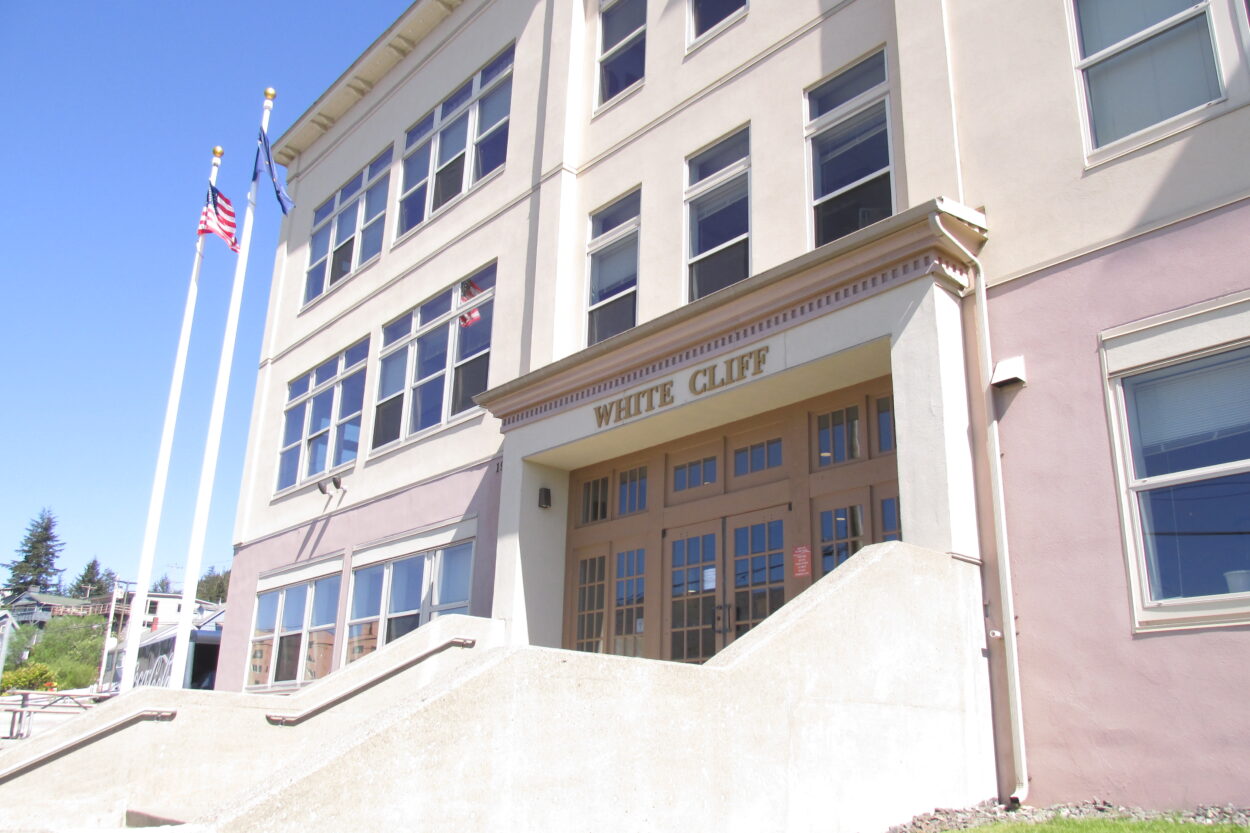
Ketchikan’s borough offices are in the White Cliff Building (KRBD staff photo)
Ketchikan’s borough assembly postponed a discussion about raising the local sales tax cap until after next month’s municipal election. The topic will appear again as an item on the agenda at the Oct. 17 meeting.
Audio PlayerThe meeting brought discussion about how urgent the need to raise the sales tax cap is in order to bring in more revenue, and whether that discussion should wait until the borough has its policy session in January. That also would be when newly elected members are seated on the assembly.
The ordinance would raise Ketchikan’s single-unit sales tax cap from $2,000 up to $12,000. It wouldn’t apply to residential rent. That’s capped at $1,000.
Ordinance 1991 was introduced by assembly member Judith McQuerry. She said the city has been discussing sales tax topics and she thinks it’s time the borough does the same.
“The city has made moves for sales tax reform and I think it’s reasonable that the borough also have a chance to amend and discuss and decide what we would like to do about sales tax reform,” she said.
The introduction came after the assembly asked staff in July to create a proposal with a goal of leveling Ketchikan’s sales tax cap with other Southeast towns.
“Based on a survey of sales tax caps in other southeast communities, staff recommends raising the cap from $2,000, the lowest among Alaska port towns, to $12,000 which would be consistent with Juneau and Sitka, which have caps of $12,800 and $12,000, respectively, and Skagway and Hoonah, which have no caps, but for specific commodities and transactions,” read materials attached to Tuesday’s agenda.
Assembly Member Grant EchoHawk said he could see why the increase would be necessary, and expressed concern with a deficit of the local education fund. He also said he’s comfortable with an incremental increase, instead of a one-time $10,000 hike.
“If we do end up postponing it or voting it down, I think it’s still important to have the discussion, and speak to why we’re even having this discussion,” he said. “And it is an issue that has been building for several years now, that our local education fund needs some kind of funding.”
EchoHawk also said that if it is postponed, he mostly worries about exacerbating an issue that’s “already been kicked down the road.”
Assembly member Austin Otos commented that the borough might look at bringing the cap up to just $4,000 instead of $12,000. He said that might soften the increase for local customers and merchants.
The assembly’s discussion turned to whether the ordinance should be postponed until a later meeting.
Jeremy Bynum recommended that option.
“I sit here and I’m very uncomfortable with us having a hypothetical question,” Bynum said.
He also argued that the topic is more suited to January’s policy session.
“I feel like we’re going a roundabout way of skirting a policy session to talk about what our real objectives and goals are for taxing, (and) what those taxes are going to be used for,” Bynum explained.
Borough Mayor Rodney Dial expressed support for waiting. He wanted the whole assembly to be meeting in-person, and thought new members could “get their feet wet” with the issue.
Otos disagreed, calling the idea of waiting a “weird fixation.”
“I will support this (postponement), I just don’t get our weird fixation on waiting for the next body to come forward,” he said. “I’m perfectly happy doing this next public hearing when there’s a full body here. But we’re the currently elected body. I just don’t get why.”
Ultimately, after a presentation of sales tax receipts, the borough assembly decided to postpone the discussion until a meeting scheduled for Oct. 17.
Raegan Miller is a Report for America corps member for KRBD. Your donation to match our RFA grant helps keep her writing stories like this one. Please consider making a tax-deductible contribution at KRBD.org/donate





